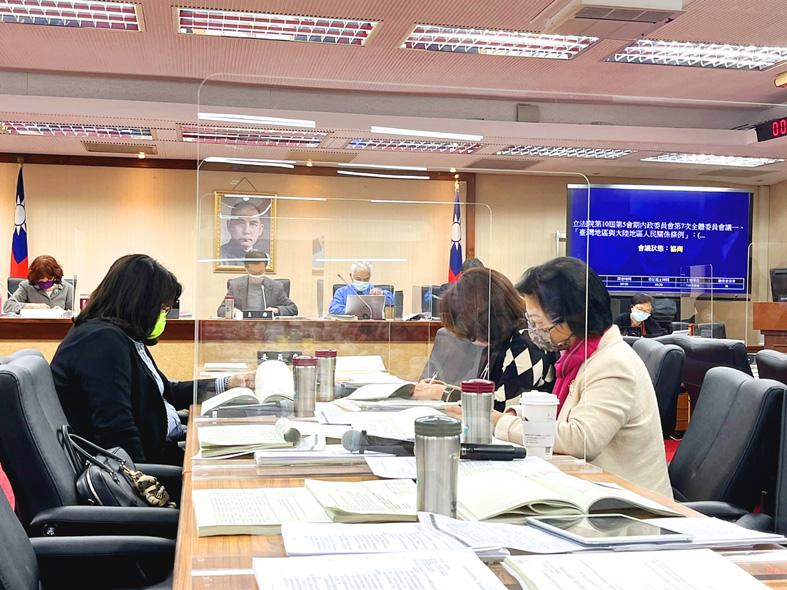The legislature’s Internal Administration Committee on Thursday approved a preliminary review of amendments seeking to prevent Chinese-funded enterprises from infiltrating the nation and poaching Taiwanese talent.
The amendments to the Act Governing Relations Between the People of the Taiwan Area and the Mainland Area (臺灣地區與大陸地區人民關係條例) were proposed in response to frequently reported cases of Chinese-funded enterprises disguising themselves as Hong Kong or other foreign-funded firms to poach Taiwanese talent or steal “core” technologies, the Mainland Affairs Council (MAC) said.
MAC Minister Chiu Tai-san (邱太三) said that Chinese-funded enterprises often illegally conduct business through associates in Taiwan or by investing in companies in a third region to evade regulations, which jeopardizes Taiwan’s economic order and national interests.

Photo: Chen Yu-fu, Taipei Times
Under the amendments, legal persons, groups and members of entities commissioned, subsidized or invested in to a certain extent by government agencies to engage in business involving the nation’s core technologies would need government approval to travel to China.
The requirement would remain for three years after the commission, subsidy or investment ends, or three years after the person has left their position.
Offenders could face fines of NT$2 million to NT$10 million (US$69,898 to US$349,491).
Chinese businesses or Chinese-funded entities based outside of China cannot engage in business activities in Taiwan without government permission, the bill says.
Contraveners would face up to three years in prison and fines of up to NT$15 million, while anyone who allows themselves to be used as surrogates for Chinese-funded businesses to operate in Taiwan under their names would face fines from NT$120,000 to NT$2.5 million.
The committee on Thursday also reviewed amendments to the National Security Act (國家安全法) that would criminalize “economic espionage” and extraterritorial use of core technologies and business secrets.
Under the proposals, people who engage or attempt to engage in economic espionage and leak information to China or foreign hostile forces would be sentenced to five to 12 years in prison and fined NT$5 million to NT$100 million.
Those who use or attempt to use business secrets outside of Taiwan would face three to 10 years in prison and fines of NT$5 million to NT$50 million.
Under the amendments, the High Court, the Intellectual Property Court and other courts dealing with commercial matters have jurisdiction over the first instance of an economic espionage case, which should be handled as soon as possible to protect national security.
People who contravene the National Security Act would be tried in special courts or their cases heard by a designated person, the amendments state.
During the review, Democratic Progressive Party Legislator Chiang Yung-chang (江永昌) said that the penalties were too light, as offenders who surrender themselves could be exempted from imprisonment, and legal persons would only have to pay fines instead of disbanding.
A lack of consensus over the amendments means the draft must be reviewed again.

The Ministry of Education (MOE) is to launch a new program to encourage international students to stay in Taiwan and explore job opportunities here after graduation, Deputy Minister of Education Yeh Ping-cheng (葉丙成) said on Friday. The government would provide full scholarships for international students to further their studies for two years in Taiwan, so those who want to pursue a master’s degree can consider applying for the program, he said. The fields included are science, technology, engineering, mathematics, semiconductors and finance, Yeh added. The program, called “Intense 2+2,” would also assist international students who completed the two years of further studies in

Former president Tsai Ing-wen (蔡英文) departed for Europe on Friday night, with planned stops in Lithuania and Denmark. Tsai arrived at Taiwan Taoyuan International Airport on Friday night, but did not speak to reporters before departing. Tsai wrote on social media later that the purpose of the trip was to reaffirm the commitment of Taiwanese to working with democratic allies to promote regional security and stability, upholding freedom and democracy, and defending their homeland. She also expressed hope that through joint efforts, Taiwan and Europe would continue to be partners building up economic resilience on the global stage. The former president was to first

Taiwan will now have four additional national holidays after the Legislative Yuan passed an amendment today, which also made Labor Day a national holiday for all sectors. The Chinese Nationalist Party (KMT) and Taiwan People’s Party (TPP) used their majority in the Legislative Yuan to pass the amendment to the Act on Implementing Memorial Days and State Holidays (紀念日及節日實施辦法), which the parties jointly proposed, in its third and final reading today. The legislature passed the bill to amend the act, which is currently enforced administratively, raising it to the legal level. The new legislation recognizes Confucius’ birthday on Sept. 28, the

CHANGES NEEDED: About 84,000 people signed a petition advocating for stronger protection laws, with people traveling from other parts of Taiwan to join the cause A rally in Taipei yesterday called on the government to increase penalties for and protections against child abuse, following the death of a one-year-old boy nicknamed Kai Kai (剴剴) in 2023. Kai Kai was allegedly tortured to death on Christmas Eve 2023 by his licensed at-home caregiver, Liu Tsai-hsuan (劉彩萱), and Liu’s sister, Liu Jou-lin (劉若琳). The two attended their final court hearing on Wednesday, with sentencing scheduled for Tuesday. The rally, organized by a group called the “Mothers’ Online Group” — a grassroots movement formed on social media by concerned parents and citizens following Kai Kai’s case — took place on